|
“Seek God and you will find God. Seek God in all things and you will find God in all things. Seek God always and you will find God always.” – St. Vincent Pallotti
Today is the 225th anniversary of the birth of St. Vincent Pallotti. In the first twenty years of his life, he experienced a pope run out of Rome by revolutionaries who died in exile and another taken from Rome and held in France by Napoleon. When that pope, Pius VII, returned in 1815, Pallotti was 20 years old and three years away from his ordination to the priesthood. He saw people who were baptized throw off their faith and take up revolution. He witnessed clergy and religious who needed renewal. Twenty years later, in 1835, he founded the Union of Catholic Apostolate, an association of lay people, religious and clergy in order to assist in the Church’s missionary efforts, revive the faith of Catholics, and enkindle charity in the hearts of all. Amid a cholera pandemic that hit Rome in 1837, he worked tirelessly along with the small and new community of priests and brothers, as well as lay people, to care for the suffering and the dying, both spiritually and physically. In the aftermath of that pandemic, which left many orphans, St. Vincent Pallotti founded through the Union of Catholic Apostolate the House of Charity in Rome in 1838. This orphanage for girls is still in operation today and is the birthplace of the Pallottine Sisters. St. Vincent Pallotti evangelized in the streets, cared for the poor, taught and provided spiritual direction to seminarians, clergy, and religious, served in prisons and hospitals, was confessor to the poor and popes, aided the Church’s work in the missions, including the United States, and fostered what today we would call collaboration and co-responsibility among Catholics so that they would live as apostles of Jesus Christ. He was also a mystic who experienced God as Infinite Love and Mercy. It was this experience of God that sent him forth, urged on by Christ’s charity or love (2 Cor. 5:14). Even seeing a third pope and long-time friend, Bl. Pius IX, flee Rome due to revolution in 1848, St. Vincent Pallotti still worked tirelessly until his death in 1850 in the hope that all would come to full life in Christ. His great project of the Union of Catholic Apostolate did not grow large in his lifetime. Today, though, thousands of his spiritual sons and daughters of the Union of Catholic Apostolate—which also includes the Pallottine Fathers, Brothers, and Sisters—continues his work in 56 countries around the world. Pallotti was canonized by St. John XXIII in 1963, just over a month after the close of the first session of the Second Vatican Council—an appropriate time given the Council’s teaching that all are called to holiness and to live as apostles of Jesus Christ. Blessings to all on the birthday of St. Vincent Pallotti! May the Charity of Christ urge us on!
1 Comment
When I was an undergraduate student studying Pastoral Ministry, I was privileged to take a class on Vatican II. One of the main documents that our course was devoted to was Sacrosanctum Concilium, or the Dogmatic Constitution on the Sacred Liturgy. Sacrosanctum Concilium is a notable document for many theological and pastoral reasons, including for the allowance of the liturgy to be celebrated in the vernacular language of local communities (36), the restoration of the adult baptismal catechumenal process employed in the early Church (64), and also the elevation of Gregorian chant as having “pride of place” in the liturgy (116). Calling it a “sacred action of Christ the priest and of His Body which is the Church” (7), the document distinguishes the liturgy as the principal act of prayer of the Church: “Nevertheless the liturgy is the summit toward which the activity of the Church is directed; at the same time it is the font from which all her power flows” (10). Besides naming the significance of the liturgy for a Church that was struggling to find her place in the midst of the modern world, Sacrosanctum Concilium also sought to form and instruct Catholics in celebrating the liturgy with “proper dispositions” (11) of their minds and hearts. In other words, for many Catholics, the liturgy was often misunderstood, attended only out of habit, or was participated in only half-heartedly. The document sought to remedy this by naming the desire of the Church “that all the faithful should be led to that fully conscious, and active participation in liturgical celebrations which is demanded by the very nature of the liturgy” (14). Full, active, and conscious participation was the standard that Sacrosanctum Concilium set for celebrating the Mass as a part of Christ’s body, the Church. In other words, according to the document, liturgy is not a spectator sport. In the liturgy, we actively remember and participate in the offering of Christ’s Body and Blood for the redemption of the world. When we attend Mass, salvation unfolds before our eyes through the words of Scripture we hear, the prayers we offer for the Church and the world, and the offering of the bread and wine by the priest on behalf of the community. In order to receive the graces of salvation that unfold before us in the liturgy, we must participate in the liturgy fully, actively, and consciously, ensuring that our “minds should be attuned to [our] voices, and that [we] should cooperate with divine grace lest [we] receive it in vain” (11). Though the liturgy is the principal act of the Church, salvation also unfolds outside of it, especially in our daily lives and experiences. Human experience is “a locus for the manifestation and realization of salvation, where God, consistently with the pedagogy of the Incarnation, reaches man with his grace and saves him” (General Directory for Catechesis, #152c). Like the liturgy, salvation unfolds right before us in our daily life; however, have we cultivated the “proper conditions” in order to receive its graces, or to even notice it? How can we apply these principles of full, conscious, and active participation in the “liturgy of our lives”? How might full, active, and conscious participation in our lives move us to a more mature faith? Full When someone has asked us for our “full” attention, what comes to mind? We may think of putting aside our cell phones to listen intently, indicating our interest and presence through appropriate body language, or taking the time to ask clarifying questions. In other words, giving full attention is an act of the entire human person—mind, body, and soul. Do we give the grace unfolding in our lives the same attention? Are we ready to put aside the things that may distract us from God so as to focus on God more readily? Does our treatment and use of our own body indicate our devotion to God and our openness to the work of the Holy Spirit? Full participation in our life moves us closer to spiritual maturity because it helps us seek integration. This includes ensuring that our actions, words, disposition, thoughts, and use of our body communicates our devotion to God and “compose[s] a single movement towards doing the will of God” (The Art of Accompaniment, 19). Are we moving with our entire personhood towards the will of God? A life lived with full participation is one that seeks integration. Active At certain points in our lives, it is easy to fall into a “maintenance” mindset instead of the mindset of mission. With an endless amount of decisions to make each day, an exhausting pace of life, or the constant struggle to catch up or move ahead, we can often fall prey to settling on surviving in our work, ministry, or lives in general. Additionally, we can be paralyzed by the multitude of paths and options in our lives. However, the work of a disciple is to continue moving forward towards Christ, even amidst uncertainty or doubt. As Pope Francis reminds us, paralysis in our lives caused by anxiety, worry, or exhaustion should not prevent us from living our call to be missionary disciples: “Anxiety can work against us by making us give up whenever we do not see instant results. Our best dreams are only attained through hope, patience and commitment, and not in haste. At the same time, we should not be hesitant, afraid to take chances or make mistakes. Avoid the paralysis of the living dead, who have no life because they are afraid to take risks, to make mistakes or to persevere in their commitments. Even if you make mistakes, you can always get up and start over, for no one has the right to rob you of hope” (Christus Vivit, 142). Though our progress in seeking holiness might not be linear and may involve many mistakes, it is always forward moving as long as we fix our hearts on Christ. A life lived with active participation is one that continually strives forward. Conscious Being attentive to grace in our lives and seeking mature faith requires intentionality. No one seeks holiness by accident; missionary discipleship requires that we make intentional choices each day to follow Christ in both small and large ways. As Pope Francis says, missionary discipleship requires the initiative of “taking the first step”: “The Church which “goes forth” is a community of missionary disciples who take the first step, who are involved and supportive, who bear fruit and rejoice. An evangelizing community knows that the Lord has taken the initiative—he has loved us first (cf. 1 Jn 4:19)—and therefore we can move forward, boldly take the initiative, go out to others, seek those who have fallen away, stand at the crossroads and welcome the outcast” (Evangelii Gaudium, 24). In order to take this first step, we must intentionally and consciously choose which way to walk. We must seek to grow in our faith on purpose. A life lived with conscious participation involves being intentional in directing our steps on the pathway towards Christ. In examining our lives by the standards of “full, active, and conscious” that Sacrosanctum Concilium names, we can bridge the gap between liturgy and life. Like full, conscious, and active participation in the liturgy, full, active, and conscious participation in our lives properly disposes us to notice God’s action and cultivate the conditions that will prevent us from receiving the graces of salvation in vain. Like liturgy, our lives are not a spectator sport. If we seek integration, commit to continuing to move forward, and intentionally make choices to walk towards Christ, we can make our entire life an offering to God through Christ in the Holy Spirit.
One of the great gifts of the Second Vatican Council and the liturgical renewal of the twentieth century was the emphasis given to the proclamation of the Word of God at all sacraments, primarily at the celebration of Mass. Popes, bishops, and theologians have all sought to highlight the relationship of the life of the Church in every dimension to the Sacred Scriptures. Scripture is the foundation of all that we do as Catholics, ultimately because Scripture is the Word of God. These divinely revealed truths tell us who God is, what He has done throughout history, and what he continues to do, working in our lives each day. Pope Francis, in continuing this call for a renewed sense of awe and appreciation of the Word of God, has proclaimed the third Sunday of Ordinary Time as “Word of God Sunday.” This past Sunday, January 26, was the first observance of Word of God Sunday, and so this week is a great time to reflect on the role that Scripture has in our lives as we seek to model our lives on Jesus Christ, the Word of God. In reflection, we can ask how do we allow the scriptures to permeate our lives so that God’s word is alive in us? Maybe we have a favorite passage, one that we return to again and again to meditate on at different stages in our lives. Or maybe we haven’t really spent much time with Scripture, aside from hearing it at Mass or other occasions in Church. This week, this Word of God Sunday, serves as a reminder to take the gift of Scripture and to allow the Word of God to seep into the rhythm of our lives so that we more fully and deeply come to know our Lord and ourselves. One of my favorite passages of Scripture is from the 24th chapter of the Gospel of Luke following the Resurrection of Jesus. We hear of the encounter that two disciples had with our Lord while walking on the road to Emmaus. These two disciples were stunned at what had taken place and were unsure of what to make of the crucifixion and death of the man they believed to be the Messiah. They were sad that their friend and leader, Jesus, had been so cruelly murdered, and were overcome with grief. When they encounter this man, a man they “were kept from recognizing” (Luke 24:16), he asked them to recount these events. Their almost sarcastic response – “Are you the only stranger in Jerusalem who does not know the things that have taken place there in these days?” (Luke 24:18) – shows us how human an experience this was for the disciples. They explained everything to this man and were shocked that he had no idea what had happened. Little did they know, they were speaking with Jesus himself! So often we focus on one problem or another, are so concerned with our own difficulties, or so caught up in our joys that we forget to consider how the Lord is working in our lives. We don’t always welcome him in and we neglect to see that, in reality, he has been there all along, walking with us on the way. Sometimes, like these two disciples, it is not until later that we see God’s work in our lives, only in reflection. It was not Jesus’ explanation about the work that God has done since Moses and the prophets that opened their eyes to the reality before them. St. Luke tells us, instead, that “was made known to them in the breaking of the bread.” (Luke 24:35) Isn’t this our experience today? We come to know about God through study or reading. But it is in and through the sacraments – especially in the Mass – that we come to know God most fully. When we pray with the Word of God in Sacred Scripture, we open our hearts to an encounter with the living God. We may not recognize him right away—it may take time or a change in our life to make it clear—but those moments when we have a real encounter with God can show us how much he has done in our lives, how close he has been all along, teaching us, guiding us, and preparing us for the great things he has in store. May this Word of God Sunday be a new invitation to welcome the Lord into our lives through his Word. May our hearing and reading of Sacred Scripture always be an encounter with God. * This post was originally published on February 5, 2013
On 20 January 1963, just over a month after the close of the first session of the Second Vatican Council, the rows of tiered seating on either side of the main aisle of St. Peter’s Basilica meant to accommodate over 2000 Council Fathers filled to capacity again. The faithful came on that day for the canonization of one person, Vincent Pallotti (21 April 1795- 22 January 1850), a priest of Rome and founder of the Union of Catholic Apostolate. Blessed John XXIII, who canonized him that day, called Pallotti “an innovator of new ways whereby people could come to know and love God.” For Pallotti this was the way of an apostle, one who is sent on mission, urged on by the love of Christ. As Blessed John XXIII explained, “the apostle does not nourish his personal concerns, nor seek his own glory, but he works for a reward far and eternal, happy to please God alone, and to bring souls, possibly all souls to his merciful love.” The Rome of Pallotti’s day was not a place of peace and tranquility. His lifetime was punctuated by revolution and his witnessing three times over the forced absence of a pope. He experienced Catholics throwing off their faith and, therefore, saw a great need to “revive faith and rekindle charity” among Catholics and also serve the growing needs of the Church in the missions. On 9 January 1835, he was inspired to found the Union of Catholic Apostolate as a response to these needs of the Church. Pallotti called the Union an “evangelical trumpet, calling all, inviting all, rekindling zeal and charity in all the faithful of every state, situation and condition” that “would effectively cooperate in all evangelical undertakings, and in the growth, defense, and propagation of charity and of the Catholic faith” (OO CC I, 4-5). His Eminence Tarcisio Cardinal Bertone, Secretary of State, summarized the elements and effect of this inspiration in a recent letter to the Pallottine family: “Living faith and active charity were the two pillars on which St. Vincent Pallotti rested firmly his whole luminous life and generous work, two inner forces that spurred and supported the many apostolic initiatives that filled his life. ‘Caritas Christi urget nos’ (2 Cor 5:14) was his motto, which also motivated his followers. The ripe fruit of his zeal was the foundation of the Union of Catholic Apostolate, that even at that time, valued the collaboration of all categories of the faithful of the Church – laity, priests, and religious – vivifying the faith of each to become an authentic apostle, carrying the fire of God’s love!” In our time there is still an urgent need to revive faith, rekindle charity, and call all the baptized to live as apostles. As in Pallotti’s day, so today, faith is being thrown off, not by revolution, but by indifference, lack of engagement, disinterest. The work of the New Evangelization as articulated by Blessed John Paul II and Pope Benedict XVI and recently reflected upon at the Synod on the New Evangelization emphasizes the intrinsic connection between faith and charity for authentic Christian living, a deepening by Catholics of their baptismal commitment through active evangelizing of self and others, and support of the missionary efforts of the Church throughout the world. These priorities of the New Evangelization were the priorities of St. Vincent Pallotti as well. They are the priorities of the Union of Catholic Apostolate today. According to Fr. Jacob Nampudakam, S.A.C., Rector General of the Society of the Catholic Apostolate and Ecclesiastical Assistant of the Union of Catholic Apostolate, “the Pallottine response to the challenge of the New Evangelization is, therefore, to revive faith and rekindle charity as apostles of Jesus in a changing world, sinking roots into a passion, the passion of St. Vincent Pallotti for Christ!” This passion for Christ in the spirit of St. Vincent Pallotti is manifesting itself for the twenty-first century in the response of the Union of Catholic Apostolate to the needs of the New Evangelization. The Union “promotes collaboration among all the faithful in openness to new forms of evangelization” (General Statutes, n. 12). The Catholic Apostolate Center in the United States of America is one of those responses. The Center is collaborating with various Church entities at the international, national, diocesan, and local levels to provide in-person and online formation programs for the New Evangelization and assists in fostering deeper collaboration and greater co-responsibility among all the baptized. In this jubilee year of the 50th anniversary of the canonization of St. Vincent Pallotti, the Union of Catholic Apostolate actively pursues what Blessed John Paul II called it to do over twenty-five years ago, “Continue to multiply your efforts so that what was prophetically announced by Vincent Pallotti, and the Second Vatican Council authoritatively confirmed, may become a happy reality, that all Christians are authentic apostles of Christ in the Church and in the world.” Fr. Frank S. Donio, S.A.C., D. Min, Director of the Catholic Apostolate Center wrote this piece for the January 23rd English edition of © L'Osservatore Romano, 2013 To commemorate the 50th Anniversary of the cannonaization of St. Vincent Pallotti check out the PALLOTTI APP featuring daily meditations, St. Vincent Pallotti’s vision, and Pallotine Community Prayers. The word vocation comes from the Latin “vocare,” which means to be called. Like any call, we are offered a choice to answer or ignore it. Assisting others in discerning their apostolic vocation in life was an important aspect of the ministry of the Catholic Apostolate Center’s patron, St. Vincent Pallotti. Pallotti had a great belief in apostleship and what the Church today refers to as the “universal call to holiness.” Many years before the Second Vatican Council formally addressed the role of the laity in the Church, Pallotti understood deeply that each member of the Body of Christ plays a significant role in evangelization. This included the active participation of the laity in collaboration with priests and religious. As the Union of the Catholic Apostolate stated in a 2012 reflection, “Saint Vincent Pallotti was the first to show that the laity on their part share different talents and vocations, possess hidden treasures, and should be employed in the work of evangelization, of edification and of sanctification.” All of this work comprises our vocation, and is what I’m referring to when I speak of our vocation with a little “v.” Before we can begin to think about whether God is calling us to religious life, marriage, or the celibate single life (known as our Vocations with a capital “v”), we must first look to live out the calling he gives all of us: holiness. I was raised outside of the Church. As a result, I wasn’t exposed to our beautiful faith (outside of my baptism) until high school. It wasn’t until three years into my high school career that I began to see religion, which had forever been just a class to me, as being something worth pursuing. Yet in high school, I more deeply came to understand Jesus’ words in Mark 2:17, “It is not those who are healthy who need a physician, but those who are sick; I did not come to call the righteous, but sinners." A life of apostleship, which will lead to the better discernment of our Vocation, is not one of perfection, but of accompaniment and relationship building. We accompany others as they live out their vocation. Similarly, we are accompanied, which helps us keep going when we fall. Our vocation is not something that we choose when to live out, but rather it is an essential and fundamental part of our lives as Christians. As baptized members of the faithful, we are called to live out our baptismal offices of priest, prophet, and king. To live out this call to holiness we must begin with prayer. Prayer, as St. Vincent Pallotti said, “consists in directing all one’s thoughts, words, and actions on God.” In fact, we should pray so much that we “pray without ceasing.” That means that we are living lives that are so full of God, so full of doing his will, that all of our actions, words, and thoughts become a prayer. It can be helpful to remember that prayer is a dialogue. Sometimes we talk and other times we are silent, waiting to hear the voice of God in whichever ways he decides to speak to us. Secondly, we live out our vocations of holiness by living a life of doing good and avoiding evil. This comes from practicing charity with our neighbors and with ourselves and from opening our hearts to those around us who Pope Francis would say are “at the margins.” Through the living out of our vocation, we help others to encounter Christ. This encounter is at the heart of our faith. As Pope Benedict XVI said, “Being Christian is not the result of an ethical choice or a lofty idea, but the encounter with an event, a person, which gives life a new horizon and a decisive direction.” Lastly, we must take part in the sacraments. God’s plan for our salvation is rooted in Christ, whose grace is poured out in all of the sacraments. We should receive the Eucharist, spend time in Adoration, and frequently receive his mercy in the Sacrament of Reconciliation. We have been given all of the tools necessary for living lives of holiness. Those tools are strengthened when we receive the sacraments. So how does living out holiness, our lowercase vocation, pertain to our Vocation? I would argue that living out our Vocation, the call to religious life, priesthood, marriage, or the celibate single life, is one of the highest achievements of living out our vocation. A marriage cannot thrive, for example, without love, hope, mercy, prayer, and kindness. Neither would the ministry of a priest or religious sister. When we truly see the beauty of the promises of Christ: salvation, freedom, mercy, and redemption, we naturally want to know how best to achieve and share them with others. When we understand our call to holiness, and live out our vocations, uppercase and lowercase “v,” then we will help to become saints and build the Kingdom of God. For more resources on Vocational Discernment, please click here. Have you ever wondered why the Church decided to celebrate Mary, as Mother of God, on the first day of each calendar year? After all, we’re still in the midst of Christmas! Isn’t this season already busy and full of Feast Days and devotions? Before she could be revealed as the Immaculate Conception, or celebrated as Our Lady of Fatima, Lourdes, or Guadalupe, or even honored as Lady Poverty by St. Francis, Mary first had to accept God’s will for her in salvation history in order to become the mother of the savior who was born on Christmas Day.
In St. Luke’s Gospel, Mary is first hailed as God’s “favored one!” If this title, bestowed by the Almighty’s messenger, wasn’t honor enough, Mary would later receive the even greater title of “Mother of God.” Her cousin St. Elizabeth would confer this title upon her with the words, “the mother of my Lord.” First, of course, Mary had to agree to what God asked of her! Mary may not have understood just how great the decision was that she made, but, despite her youth, she nevertheless had the great gift of faith in God. Because of her infinite trust in God and her famed fiat, we can definitively venerate Mary, the Mother of God, and ask for her intercession. Mary fulfills a unique role in the Mystery of Christ and the Church. Hailed as Theotokos (literally, “God Bearer”) by the Church in 431 at the First Council of Ephesus, Mary’s title reflects not only her role in salvation history, but also asserts the divinity of Christ. Just as the moon does not bear its own light but instead reflects the light from the sun, Mary entirely reflects the brilliance and grace of God. While a universal celebration on October 11 of the feast of the “Maternity of the Blessed Virgin Mary” was not declared by the Church until 1931 by Pope Pius XI, history records similar celebrations as part of the Christmas octave as early as the 13th or 14th century in Rome and Spain. Later celebrations developed in the 18th century in Portugal, Brazil, and Algeria and continued to take root around the world. After this great feast was finally moved to the first day of January by Pope St. John XXIII (in his 1960 revision of the liturgical calendar and rites), the Church would, at the Council Second Vatican, reaffirm Mary’s place in the Church Universal: Redeemed by reason of the merits of her Son and united to Him by a close and indissoluble tie, she is endowed with the high office and dignity of being the Mother of the Son of God, by which account she is also the beloved daughter of the Father and the temple of the Holy Spirit. Because of this gift of sublime grace she far surpasses all creatures, both in heaven and on earth. At the same time, however, because she belongs to the offspring of Adam she is one with all those who are to be saved. She is “the mother of the members of Christ... having cooperated by charity that faithful might be born in the Church, who are members of that Head.”… The Catholic Church, taught by the Holy Spirit, honors her with filial affection and piety as a most beloved mother. Even more recently, Pope Francis reflected upon why Mary is thus honored as the Mother of God and not just the Mother of Jesus: From the moment that our Lord became incarnate in Mary, and for all time, he took on our humanity. There is no longer God without man; the flesh Jesus took from his Mother is our own, now and for all eternity. To call Mary the Mother of God reminds us of this: God is close to humanity, even as a child is close to the mother who bears him in her womb. As we continue our celebration of Christmas, let us consider how, in His mother, God the Son was made Incarnate not only to be with us, but also to be like us! The Blessed Mother, seen in every nativity scene, faithfully watches over the infant in the manger as the Mother of God and also as mother to each of us! She does so with great love, silently in her heart (cf. Luke 2:51). In Mary we find what really matters—not only during the Christmas season, but in the whole of the Christian life. As her children, may we look upon Mary with love and faithfully call upon her intercession with great affection. From October 3rd until the 28th, 2018 bishops from around the globe are gathering in Vatican City for the 15th Ordinary General Assembly of the Synod of Bishops. The Synod is an assembly of the world’s bishops who assist the pope by offering insights on important questions the Church is facing in a manner that preserves and promotes her teachings. A General Assembly of the Synod of Bishops is called “Ordinary” if its topic is “for the good of the universal Church” and seems to require the “learning, prudence and counsel” of all the world's bishops. For October’s historic meeting, Pope Francis dedicated the theme to “Young People, the Faith, and Vocational Discernment.” Although the young adults invited to participate were not voting members of the Synod, they had the opportunity to address the Order of Bishops as presenters and auditors. It can be useful to consider the gathering as a conversation that included involvement from bishops and small group sessions. These activities were a beautiful continuation of the dialogue and collaboration characteristic of the Second Vatican Council: of a Church embracing renewal throughout the Body of Christ.
Yet the vast majority of the Church was not in the Vatican participating in small groups, sharing experiences, or making presentations. While the meeting has been significant in its own right, it may not be on the forefront of most people’s minds a city—let alone an ocean—away. As we wait for the working documents of the meeting to be finalized and published, we may be asking how we can best support the work of the Synod from afar. As a young person myself, I think it is incredible that this demographic is being discussed and studied at length by the Church. The Synod inspires a unique opportunity to ponder young people’s place in the Church and world. The typical young person is preoccupied with studies or work, family and social obligations, and sorting out his or her place in an ever-changing world. Thanks to technology, the world is better connected in some senses, though what occurs daily in our physical sphere tends to represent the extent to which a young person may physically engage with the outside world. Why think about faraway gatherings when there is plenty to deal with right in front of you? You may also wonder, Why would anyone care about little ole me and what I do? But that’s exactly what—and who—the Holy Father is interested in hearing about. Over a year before the Synod was scheduled to meet, Pope Francis released his Letter to Young People and invited youth to “Make your voice heard, let it resonate in communities and let it be heard by your shepherds of souls.” To help facilitate gathering the input of young people, the Vatican Synod Office launched a special website and survey which invited responses that were incorporated into a working document. Furthermore, Pope Francis issued his latest Apostolic Exhortation, Gaudete et Exsultate, on the call to holiness in today’s world, which directly relates to the vocational aspects of the Synod. Seeking for something more concrete? Look no further than your own parish! The walls of a church are not designed to keep persons out, but to gather them in to live more actively in Christ and the Church Universal! Never doubt the awesome power of prayer: interceding for not only the participants of the Synod, but those around you whose needs you may know personally. Go a step further and offer your gifts, talents, time, and presence as a young person and give witness to charity. Show the world that young people are not self-absorbed but active and invested in promoting the good of humanity. Find others who want to make a difference. Invite them to pray with you, to volunteer in service, to catechize, and even just to share in the joys and fun of youth. Demonstrate that youth is not just a period of transition, but an opportunity to channel passion and energy in a meaningful and responsible way for the Church and world. A lesson from the 2018 Synod is that the Church wants to better minister to young people! Recognizing young people as a treasure not merely for the future, but for the Church here and now signifies their potential and important state in life. Instilling the values of the Faith in young people inspires them to more actively discern God’s call for them in holy vocations. The world is not perfect—neither is the Church—but recognizing the good that can be brought about and the ability to pick oneself up after falling short is a great gift God has uniquely given young people to witness! By growing in our vocation to holiness, we fulfill the mission and dream of this year’s Synod. What a joy it is to see young people take to heart the holiness that God has called them to. To learn more about the recent Synod on Young People, the Faith, and Vocational Discernment, please click here. On October 14, 2018, Pope Francis will canonize two great church leaders who helped shape Catholicism across the globe in the second half of the twentieth century: Pope Paul VI and Archbishop Oscar Romero. In reflecting on their lives, I cannot do justice to the complex and controversial circumstances that forged these extraordinary men into the saints they are. Instead, I’d like to reflect on something common and fundamental to us and them: Baptism. Baptism sets the foundation for a lifelong calling and mission. The Catechism calls Baptism “the basis of the whole Christian life” and “the gateway to life in the Spirit” (CCC 1213). A saint is someone who lives their baptismal identity to the full. The three fundamentals we are called to live and practice “on entering the People of God through faith and Baptism” (CCC 783) are what we call the “three offices of Christ”: Priest, Prophet, and King. What made Pope Paul VI and Archbishop Oscar Romero saints was the integrity and fullness with which they lived out their baptismal vocations as priest, prophet, and king. Priestly Vocation Both Pope Paul VI and Oscar Romero were ordained Catholic priests, but by virtue of their Baptism they shared what we call the “priesthood of the faithful.” What is this priestly vocation? We live it by offering prayer and sacrifice for others. At the heart of every saint is a love for and commitment to prayer. Archbishop Romero lived his priestly vocation in a powerful and tragic way when he was martyred on March 24, 1980 while celebrating Mass in Divina Providentia Hospital—uniting his prayer and sacrifice with Christ’s into eternity. Prophetic Vocation Paul VI and Oscar Romero excelled at the way they lived the prophetic vocation of their Baptism. A prophet, in the biblical sense, is someone called by God to deliver a message of truth through either words or actions. One of my favorite descriptions of a prophet is one who comforts the afflicted and afflicts the comfortable. During their lifetime, prophets are often inconvenient, unpopular, or even attacked, but history proves they shared the right message at exactly the right time. Both Paul VI and Oscar Romero faced harsh criticism, and Romero (as did many other prophets through history) suffered martyrdom. When Paul VI issued the encyclical letter Humanae Vitae (1968), which affirmed traditional Catholic teaching on sexual ethics, he faced a wave of criticism and dissent in the Church. Fifty years later, many Catholic moral theologians and historians see that his analysis and predictions were right on target. Archbishop Romero, standing in the tradition of Old Testament prophets like Amos and Isaiah, stood up and spoke out to the government (known as the Junta) in his home country of El Salvador, as well as other world governments (including the United States), on behalf of the poor and marginalized who were being treated unjustly. Like Paul VI and Romero, every baptized person is called to stand up and speak out for truth and justice, especially when it is unpopular or inconvenient. Royal Vocation While we gravitate toward thinking of the “royal” or “kingly” role as one of being above or served by others, it is actually the exact opposite. A true leader is one completely dedicated to serving others through his administration and decision-making. I can think of few more monumental or difficult tasks a church leader faced than Pope Paul VI when he was called by the Church to steer the conclusion and implementation of the Second Vatican Council (1962-65), which has been called the single most important religious event in the twentieth century. Archbishop Oscar Romero was often criticized for his ecclesial administration getting mixed up with the political situation. Yet Romero recognized that in order to effectively lead and serve the church under his pastoral care, he needed to engage the civil government around him. We, like Paul VI and Oscar Romero, do not become saints by being perfect administrators or leaders, but by bringing God’s spirit of wisdom into the challenges and opportunities that come our way. I would guess that at their baptism and even priestly ordination, Paul VI and Oscar Romero had no idea how God had planned for them to exercise their royal vocation. Under extraordinary times and circumstances, these saints modelled for us how we all are called to exercise leadership in ordinary, everyday circumstances with humility and whole-hearted devotion to God and others. On October 14, let us rededicate ourselves to living our own priestly, prophetic, and royal vocation of Baptism with the same spirit and integrity as Pope Paul VI and Archbishop Oscar Romero. Please click the following links for more information about the canonization and lives of Pope Paul VI and Oscar Romero. The call to evangelize is at the heart of our Christian faith. We are evangelizers at our core; it makes up our very identity. And yet, if I were to ask most people sitting in the church pews at Mass if they are evangelists, they would probably shake their heads and identify themselves in other terms: vocation, occupation, role in the family, country of origin. A professor of mine in graduate school put it starkly when he said most of the laity are experiencing an “identity crisis.” We do not know, or have forgotten, who we are as members of the Body of Christ and what our role is within it. Today, Pope Francis echoes his predecessors in reminding the laity of their call to become missionary disciples. This is a call that originates from God Himself, with the Risen Christ saying to his beloved disciples before ascending to the Father, “Go and make disciples of all nations.” These words reverberate ever more powerfully for us today. Though the universal call to holiness and a greater emphasis on evangelization has roots in the papacy of Pope Paul VI and within the Second Vatican Council, Pope Francis calls the concept of sharing our encounter with Jesus Christ using the means available to us “missionary discipleship.” It is a profound concept that Pope Francis assures us is relatively simple. “The new evangelization calls for personal involvement on the part of each of the baptized,” he writes in Evangelii Gaudium. “Every Christian is challenged, here and now, to be actively engaged in evangelization; indeed, anyone who has truly experienced God’s saving love does not need much time or lengthy training to go out and proclaim that love.” Once we have encountered Jesus Christ and His merciful love, we are called to bring that encounter to others, therefore playing a unique role in salvation history. Several of my colleagues from the Catholic Apostolate Center and I were honored to discuss “The Call to Missionary Discipleship” at the Catechetical Day hosted by the Archdiocese of Washington in late October. We discussed that, as baptized Christians, we have been given the grace of Jesus Christ in order to respond to the both daunting and exhilarating call to “go out to all the nations.” This understanding of evangelization subsists not only on our personal encounter with God’s transforming love, but also on our proclamation of it. It is not enough to encounter Jesus Christ for ourselves. Like the woman at the well, we must go forth telling anyone who will listen, “Come see a man who told me everything I have done.” Below are five practical tips we came up with for living out the call to be a missionary disciple. What are we missing? Feel free to add to our list by commenting on our post below! 1. Collaboration If we are to be missionary disciples, we must be people of collaboration. This does not mean that we attend endless meetings, join committees, or fill every moment of our schedule. We propose collaboration from the beginning, which means a willingness to begin an endeavor communally with others—recognizing the valuable role each person has. Collaboration must happen among, for, and with those in our parishes and organizations. It requires openness to the promptings of the Holy Spirit, humility, dialogue, and flexibility. How can you learn from others in your community, parish, family, workplace, or neighborhood? How might God use the gifts and talents of a diverse group of people to strengthen His kingdom on earth? 2. Technology As followers of Jesus Christ, we are called to use the tools of this present age in order to re-present the Gospel to our world in a way that is innovative and re-invigorated. A major tool today that can be used to spread the Gospel message is technology, especially the internet. We can share digital content that is valuable, such as Scripture, the Catechism, and Papal and Conciliar documents, in order to become better informed about our faith. Technology can also create a new type of community, enabling us to connect with others and share information in a way that is cost-effective and not limited to physical proximity. What are some ways you can use technology to spread the Gospel and help build a civilization of love? 3. Community/Parish Life We do not exist in isolation. As Christians, our work of evangelization will not bear much fruit if we do it alone. Our community, especially our parish, strengthens us and equips us to go outside our church walls in order to evangelize. It is within the parish that we receive the sacraments, especially the Eucharist, which gives us the grace of Christ Himself. In order to be effective as missionary disciples, we are called to have a vibrant sacramental life strengthened by our communities. How does your parish community strengthen you for your mission of discipleship? 4. Relationships Relationships outside of the parish are also crucial to missionary discipleship. As mentioned above, we do not exist in isolation. Do we have a mentor or spiritual guide helping us to grow in our faith life? Do we have relationships or friendships that hold us accountable and push us to become better witnesses of faith? By developing faith-filled relationships and surrounding ourselves with mentors and guides, we ensure that we continue to grow in our role as missionary disciples. 5. Prayer Prayer is crucial not only to a life of missionary discipleship, but to the Christian life overall. Prayer is the foundation for our relationship with God, inviting us to get to know ourselves more deeply through his gaze of love and mercy and helping us to better understand our specific mission in building up the Body of Christ. Prayer can, and should be, both personal and communal. God speaks in the silence of our hearts, as well as through others. Are we carving out time in silence to converse with God and hear the promptings of the Holy Spirit? Do we read Scripture, pray the Rosary, journal, sing hymns, or reflect? By having an active prayer life, we will be better equipped to become fruitful missionary disciples. The call to missionary discipleship is both daunting and exciting, and we can live it out at any time. As Pope Francis wrote in Evangelii Gaudium, “Being a disciple means being constantly ready to bring the love of Jesus to others, and this can happen unexpectedly and in any place: on the street, in a city square, during work, on a journey.” Above, I’ve listed a few tips to fulfilling our call to become missionary disciples. What would you add to the list? Editor's note: This post was originally published in November 2017. Since its publication, the Catholic Apostolate Center has expanded its vision and resources for living as missionary disciples. Please see our "Living as Missionary Disciples" resources page and our 2017 e-book Living as Missionary Disciples: a Resource for Evangelization that was produced in collaboration with the USCCB. “Everything is well when it is done as God wishes.” – St. Vincent Pallotti
In October, there will be a Synod of Bishops devoted to the interconnection between faith and vocational discernment in the lives of young people. When a person in Catholic circles, especially a young person, says that she or he is “discerning a vocation,” usually this means consecrated life or priesthood. More often today, though, it also includes discernment of whether one is called to the vocation of marriage. Over the last two decades, I have had the privilege of accompanying numerous young adults who are discerning their vocation. As they have come to a decision about a life vocation, I have witnessed their marriages, consecrations, and ordinations. During this year alone, many months have been filled with the joy of such events which will continue into the foreseeable future. Such moments bring me great joy as they should for the Church. More so, though, we are called to discern the ways in which we can live our primary vocation, the call to holiness. This call, as the Second Vatican Council taught, is “universal” (Lumen Gentium, c. V) It is what God desires of all human beings, to live in a loving union with God and neighbor that leads to salvation. Pope Francis teaches us in Gaudete et Exsultate that “This holiness to which the Lord calls you will grow through small gestures” (GE, 16). Small gestures lead to larger action through discernment. Is such discernment easy? No. In fact, it is challenging and difficult and can be a cross. But, we are called to take up our cross and follow (Mk 8:34) since no one is called to be a professional discerner. We are called to make choices that are for Christ and witnessed through our love and care for our neighbor. Simply praying, thinking, or talking is not enough. We are challenged to move forward. “It involves striving untrammeled for all that is great, better and more beautiful, while at the same time being concerned for the little things, for each day’s responsibilities and commitments” (GE, 169). May the Charity of Christ urge us on! In God, the Infinite Love, Fr. Frank 6/1/2018 Remarks on Accepting the Gaudium et Spes Award from the National Association for Lay MinistryRead NowToday, the Catholic Apostolate Center and our Director, Fr. Frank Donio, S.A.C., were honored with the Gaudium et Spes Award from the National Association for Lay Ministry (NALM) at an awards luncheon jointly hosted by NALM and National Conference of Catechetical Leadership (NCCL).
The award recognizes an outstanding individual or organization for promoting understanding of the Church in the world according to the vision of Vatican II. It is the highest honor that the association can bestow. Although the award has been given eighteen times since its inception in 1989, NALM has only recognized an individual and an organization together once before. Fr. Frank and the Center were chosen for this award because of the extensive collaboration they engage in through his ministry as a Pallottine priest and the work of the Center. The Center was recognized for its ability to provide extensive resources to individuals and ministries so that many can revive faith, rekindle charity, and form apostles. National Association for Lay Ministry Gaudium et Spes Award Catholic Apostolate Center and Fr. Frank Donio, S.A.C. Chicago, IL June 1, 2018 On behalf of the entire Catholic Apostolate Center team working on three continents, I wish to thank Deacon Keith Davis, his predecessor as Board Chair, Mark Erdosy, the National Association for Lay Ministry Board of Directors and the members of NALM for this Gaudium et Spes Award. In recognizing the Center and me, you are also recognizing the charism of St. Vincent Pallotti. He believed that all are called to be apostles and created in Rome in 1835 a co-responsible and collaborative association of lay people, religious, and clergy called the Union of Catholic Apostolate; whose mission was and is to be what he called “an evangelical trumpet, perpetually calling everyone and awakening the zeal and charity of all the faithful” (OOCC I, 4-5). You are also recognizing my fellow members of the Immaculate Conception Province of the Society of the Catholic Apostolate, the Pallottine Fathers and Brothers, who as a Province have an almost seventy-year commitment to lay apostolate and after Vatican II to lay ministry as well, including founding the Catholic Apostolate Center in 2011 as an official ministry of the Province. Finally, and very importantly, you are recognizing the team of mostly young adults who comprise the staff of the Catholic Apostolate Center. The Center, while not a young adult organization, is an organization that is open and welcoming to young adults. We provide accompaniment and mentorship and show how that can be done not only with peers, but with all in Church leadership. We welcome and utilize the creativity of young adults and provide leadership opportunities. All of this is also done in collaboration with many Church entities such as the USCCB, various national Catholic organizations, including all the sponsoring groups of this conference, dioceses, movements, and associations as well long-serving professionals in ministry. We use collaborative and technological means to accomplish our mission to provide formative evangelization resources for active Catholics to help them become apostles or missionary disciples sent to assist others in encountering Jesus Christ and the Church. We develop greater collaboration and co-responsibility among Catholic leaders. We do this through living our vision that comes to us from St. Vincent Pallotti – reviving faith, rekindling charity, and forming apostles. Our hope is that our model of a Catholic organization, ever open to the initiative of the Holy Spirit, can assist others in moving beyond “We have always done it this way” (Evangelii Gaudium, 33), while at the same time keeping continuity with the tradition and teachings of the Church. Again, many thanks to the National Association for Lay Ministry for this recognition. We promise to deepen our efforts to assist the Church in its “duty of scrutinizing the signs of the times and of interpreting them in the light of the Gospel” (Gaudium et Spes, 4). May the Charity of Christ urge us on! “Blessed Paul VI, in referring to obstacles to evangelization, spoke of a lack of fervor (parrhesía) that is ‘all the more serious because it comes from within’. How often we are tempted to keep close to the shore! Yet the Lord calls us to put out into the deep and let down our nets (cf. Lk 5:4). He bids us spend our lives in his service. Clinging to him, we are inspired to put all our charisms at the service of others. May we always feel compelled by his love (2 Cor 5:14) and say with Saint Paul: ‘Woe to me if I do not preach the Gospel’ (1 Cor 9:16).” – Pope Francis, Gaudete et Exsultate, 130.
In the passage above from Gaudete et Exsultate (Rejoice and Be Glad), an apostolic exhortation on the “call to holiness in today’s world,” Pope Francis offers a concise summary of over forty years of papal teaching on evangelization as well as over two thousand years of the Church’s missionary efforts of the baptized going forth to all in word and deed in the name of Jesus Christ. Over fifty years since the close of the Second Vatican Council, the teaching that holiness is possible for all (Lumen Gentium, 11) or the “universal call to holiness,” seems to be still a teaching that is not fully received by all the baptized, partially because of an understanding on the part of some that growth in holiness needs a special and particular way or is only possible for certain people. Pope Francis disagrees with this view: “We are frequently tempted to think that holiness is only for those who can withdraw from ordinary affairs to spend much time in prayer. That is not the case. We are all called to be holy by living our lives with love and by bearing witness in everything we do, wherever we find ourselves” (GE, 14). But, just what is “holiness?” Pope Francis offers a definition of Pope Emeritus Benedict, “holiness is charity lived to the full” (GE, 21). It is the charity of Christ living in and through us. Pope Francis, continuing to quote Pope Benedict, provides further reflection: “As a result, ‘the measure of our holiness stems from the stature that Christ achieves in us, to the extent that, by the power of the Holy Spirit, we model our whole life on his’” (GE, 21) Modelling our “whole life on his” needs to be done through moving outward on mission (EG 18-34) in mercy and love toward our brothers and sisters who are near us every day (GE, 63-109). It is done through our discernment (GE, 166-175), prayer, and worship (GE, 147-157) in the community of faith, the Church (EG, 140-146), resisting evil and doing good (GE, 158-165). “Accepting daily the path of the Gospel, even though it may cause us problems: that is holiness.” (GE, 94). May the Charity of Christ urge us on! (2 Cor 5:14) The call to evangelize is at the heart of our Christian faith. We are evangelizers at our core; it makes up our very identity. And yet, if I were to ask most people sitting in the church pews at Mass if they are evangelists, they would probably shake their heads and identify themselves in other terms: vocation, occupation, role in the family, country of origin. A professor of mine in graduate school put it starkly when he said most of the laity are experiencing an “identity crisis.” We do not know, or have forgotten, who we are as members of the Body of Christ and what our role is within it. Today, Pope Francis echoes his predecessors in reminding the laity of their call to become missionary disciples. This is a call that originates from God Himself, with the Risen Christ saying to his beloved disciples before ascending to the Father, “Go and make disciples of all nations.” These words reverberate ever more powerfully for us today. Though the universal call to holiness and a greater emphasis on evangelization has roots in the papacy of Pope Paul VI and within the Second Vatican Council, Pope Francis calls the concept of sharing our encounter with Jesus Christ using the means available to us “missionary discipleship.” It is a profound concept that Pope Francis assures us is relatively simple. “The new evangelization calls for personal involvement on the part of each of the baptized,” he writes in Evangelii Gaudium. “Every Christian is challenged, here and now, to be actively engaged in evangelization; indeed, anyone who has truly experienced God’s saving love does not need much time or lengthy training to go out and proclaim that love.” Once we have encountered Jesus Christ and His merciful love, we are called to bring that encounter to others, therefore playing a unique role in salvation history. Several of my colleagues from the Catholic Apostolate Center and I were honored to discuss “The Call to Missionary Discipleship” at the Catechetical Day hosted by the Archdiocese of Washington in late October. We discussed that, as baptized Christians, we have been given the grace of Jesus Christ in order to respond to the both daunting and exhilarating call to “go out to all the nations.” This understanding of evangelization subsists not only on our personal encounter with God’s transforming love, but also on our proclamation of it. It is not enough to encounter Jesus Christ for ourselves. Like the woman at the well, we must go forth telling anyone who will listen, “Come see a man who told me everything I have done.” Below are five practical tips we came up with for living out the call to be a missionary disciple. What are we missing? Feel free to add to our list by commenting on our post below! 1. Collaboration If we are to be missionary disciples, we must be people of collaboration. This does not mean that we attend endless meetings, join committees, or fill every moment of our schedule. We propose collaboration from the beginning, which means a willingness to begin an endeavor communally with others—recognizing the valuable role each person has. Collaboration must happen among, for, and with those in our parishes and organizations. It requires openness to the promptings of the Holy Spirit, humility, dialogue, and flexibility. How can you learn from others in your community, parish, family, workplace, or neighborhood? How might God use the gifts and talents of a diverse group of people to strengthen His kingdom on earth? 2. Technology As followers of Jesus Christ, we are called to use the tools of this present age in order to re-present the Gospel to our world in a way that is innovative and re-invigorated. A major tool today that can be used to spread the Gospel message is technology, especially the internet. We can share digital content that is valuable, such as Scripture, the Catechism, and Papal and Conciliar documents, in order to become better informed about our faith. Technology can also create a new type of community, enabling us to connect with others and share information in a way that is cost-effective and not limited to physical proximity. What are some ways you can use technology to spread the Gospel and help build a civilization of love? 3. Community/Parish Life We do not exist in isolation. As Christians, our work of evangelization will not bear much fruit if we do it alone. Our community, especially our parish, strengthens us and equips us to go outside our church walls in order to evangelize. It is within the parish that we receive the sacraments, especially the Eucharist, which gives us the grace of Christ Himself. In order to be effective as missionary disciples, we are called to have a vibrant sacramental life strengthened by our communities. How does your parish community strengthen you for your mission of discipleship? 4. Relationships Relationships outside of the parish are also crucial to missionary discipleship. As mentioned above, we do not exist in isolation. Do we have a mentor or spiritual guide helping us to grow in our faith life? Do we have relationships or friendships that hold us accountable and push us to become better witnesses of faith? By developing faith-filled relationships and surrounding ourselves with mentors and guides, we ensure that we continue to grow in our role as missionary disciples. 5. Prayer Prayer is crucial not only to a life of missionary discipleship, but to the Christian life overall. Prayer is the foundation for our relationship with God, inviting us to get to know ourselves more deeply through his gaze of love and mercy and helping us to better understand our specific mission in building up the Body of Christ. Prayer can, and should be, both personal and communal. God speaks in the silence of our hearts, as well as through others. Are we carving out time in silence to converse with God and hear the promptings of the Holy Spirit? Do we read Scripture, pray the Rosary, journal, sing hymns, or reflect? By having an active prayer life, we will be better equipped to become fruitful missionary disciples. The call to missionary discipleship is both daunting and exciting, and we can live it out at any time. As Pope Francis wrote in Evangelii Gaudium, “Being a disciple means being constantly ready to bring the love of Jesus to others, and this can happen unexpectedly and in any place: on the street, in a city square, during work, on a journey.” Above, I’ve listed a few tips to fulfilling our call to become missionary disciples. What would you add to the list? To learn what the Catholic Apostolate Center is doing to form missionary disciples, click here to learn about Apostles on Mission. "The questions lurking in human hearts and the real challenges of life can make us feel bewildered, inadequate and hopeless. The Christian mission might appear to be mere utopian illusion or at least something beyond our reach. Yet if we contemplate the risen Jesus walking alongside the disciples of Emmaus (cf. Lk 24:13-15), we can be filled with new confidence" - Pope Francis, Message for 2017 World Day of Prayer for Vocations.
Discerning one's vocation in life is not easy. It is a challenge, particularly if one thinks one is alone. But, we as baptized realize that we are not alone. Jesus Christ is walking with us in the same way in which he walked with the disciples on the road to Emmaus. He accompanies us through the community of faith, the Church. We encounter Christ and are accompanied on our journey in our participation in the Sacraments, through the teachings of our Faith, by the Church's ministers, and in communion with the People of God. In our personal prayer, he is present as well, but we need to quiet ourselves and hear the "tiny whispering sound" as did the Prophet Elijah in the cave ( 1 Kings 19:12). As St. Vincent Pallotti taught in the nineteenth century, so does the Second Vatican Council and the Popes that followed, we are called to be apostles or missionary disciples. We have an apostolic vocation in life. Even those who are contemplative pray not for themselves, but for the whole Church. Whatever our particular vocation - marriage, Consecrated Life, or priesthood - we are all sent by God on mission to our brothers and sisters, witnessing Christ by what we say and do. We are called to accompany others in prayer and action in encountering Christ. Over the last years, I have had the privilege of accompanying many young men and women as they discerned their vocation in life. As each would make her or his choice after a long questioning and search that was sometimes bewildering, a sense of profound peace would come upon them. This is the peace that comes from Christ in and through the Holy Spirit. It is the peace that he has left us as his missionary disciples so that we may go forth in his name! May the Charity of Christ urge us on! Not long ago, I sat listening to the words of my university’s honored commencement speaker, Peggy Noonan, who entreated us to do something after we graduated that day: “You must not stop reading books. That’s all. If you seek a happy and interesting life, one of depth, meaning and accomplishment, you must read books.” I thought that to be a simple message—but refreshingly concrete and unique. As she pointed out, to get to graduation day my peers and I had read a number of books. Most were works assigned as required reading for a course rather than for leisure. Continuing to read after a life in school would benefit us, Noonan said, as we moved through life to new places, with new people, and into new positions.
As a Catholic, I took Ms. Noonan’s advice as an opportunity to seriously take up spiritual reading. I previously had taken advantage of my Catholic high school’s library to some degree, but I often had to let spiritual reading take second place behind the demands of other commitments. This continued in college with the much larger university library collections. There seemed to be no time to read for the sake of reading, spiritual or otherwise. While I may not have had much choice at the time, I know that when the faithful disregard the great literary works of Catholicism, we do ourselves a great disservice. With its full and ever-expanding breadth of writings, the Church encourages the faithful to enrich themselves through the works of popes, saints, and the Magisterium, along with theologians, mystics, clergy, and religious (see CCC 133). These can offer many insightful perspectives on the Faith, but they cannot replace reading the Bible! As St. Jerome remarked, “Ignorance of Scripture is ignorance of Christ!” Similarly, the Second Vatican Council affirmed the Word of God as “food for the soul, the pure and everlasting source of spiritual life.” (Dei Verbum, 21) We may spend years studying books for school and for professional development—how much more should we pore over the Word of God “to build you up and give you your heritage among all those who are sanctified”? We nourish ourselves with physical food multiple times a day, shouldn’t we do the same with spiritual nourishment? When I worked in a Catholic bookstore, my boss shared this insight from St. John Bosco: “Only God knows the good that can come about by reading one good Catholic book.” Customers might have wandered in to buy a rosary or Catholic memorabilia, but many times I noticed them stop in front of a display of books on family life, spirituality, or healing prayers. As I assisted them with their selections, many would share their favorite devotions or ask for guidance in selecting a title. The customers were seeking writings by those whose experiences they could relate to—authors whose work would speak to our customers just as Sacred Scripture speaks to each of us and motivates us to seek and undertake the will of God. On other occasions, customers would simply be looking for something new to deepen their spirituality and share what they learned with their family and friends. I have observed that the benefits of supporting Catholic bookstores extend in many ways: not only does it help a business to continue providing accessible, quality literature, but it also offers customers the chance to find something meaningful and wholesome that will be useful in subsequent questions, reflections, and experiences long after the first reading. Consider dusting off your Bible or picking up that Catholic book on your table. Spend a few moments and allow yourself to be touched by the author’s message and then share the experience with loved ones. Start a book club with friends and neighbors to discuss a spiritual work and apply it to your day to day life. The words of an approved source can galvanize, console, clarify, educate, or guide your spiritual formation. As Ms. Noonan reminded us, continual reading throughout our lives, especially of spiritual works, will give our lives greater depth and meaning. Start by picking up the book. Questions for Reflection: Is there a spiritual book or book from the Bible you’ve been meaning to read? How has a book or Scripture passage impacted your life? |
Details
Archives
July 2024
Categories
All
|
About |
Media |
© COPYRIGHT 2024 | ALL RIGHTS RESERVED

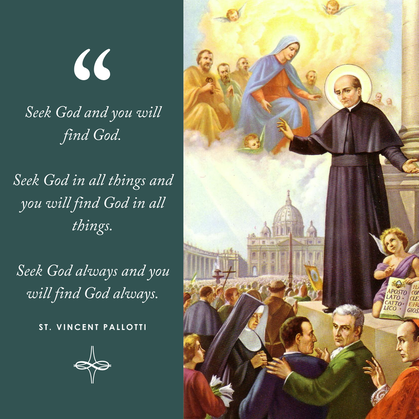
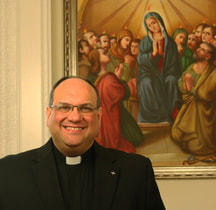
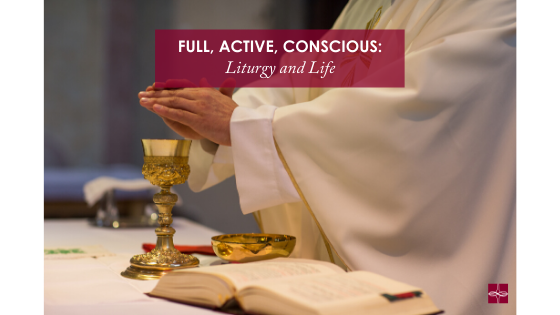

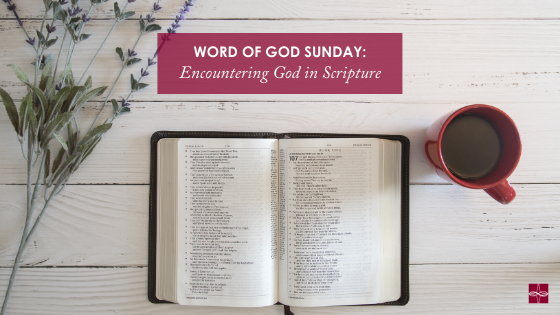
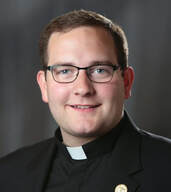
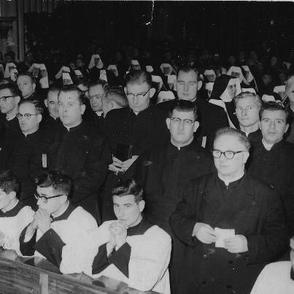
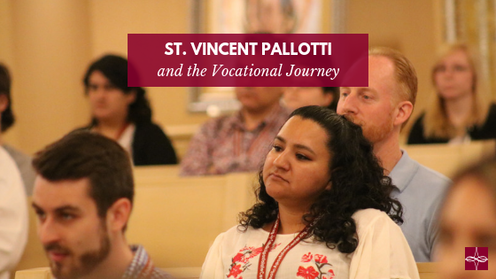

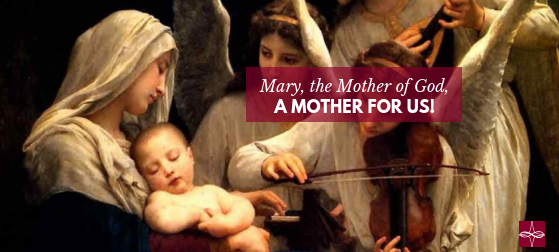

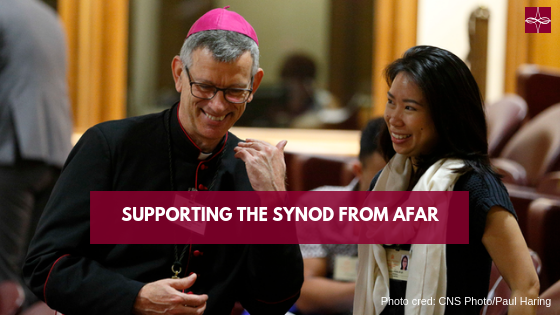

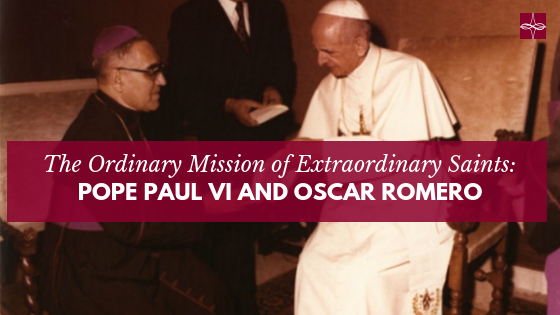



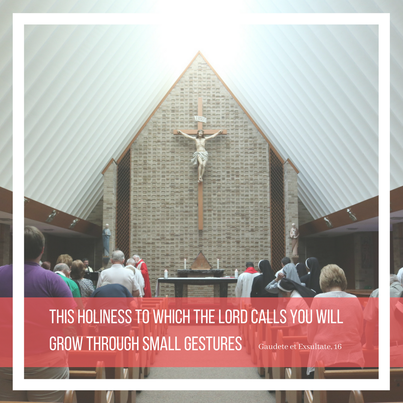
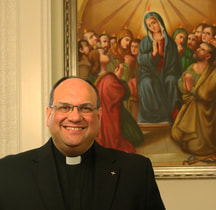
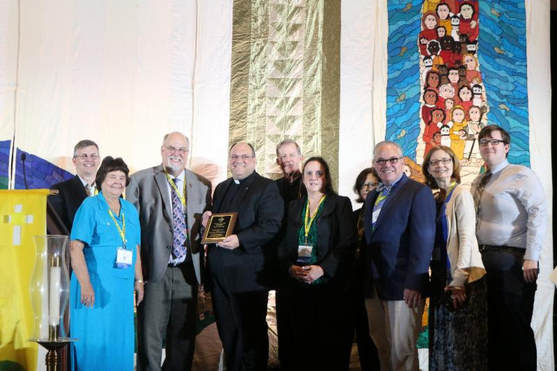
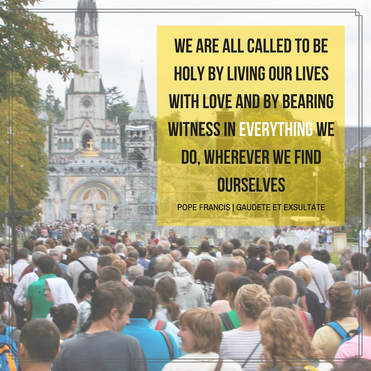


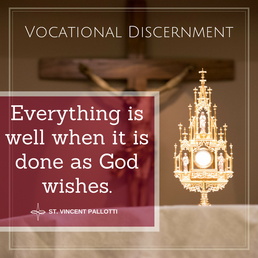
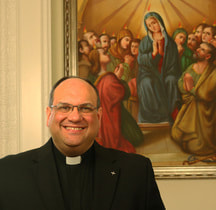


 RSS Feed
RSS Feed